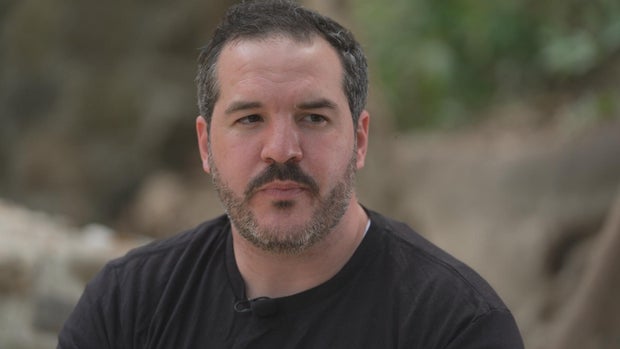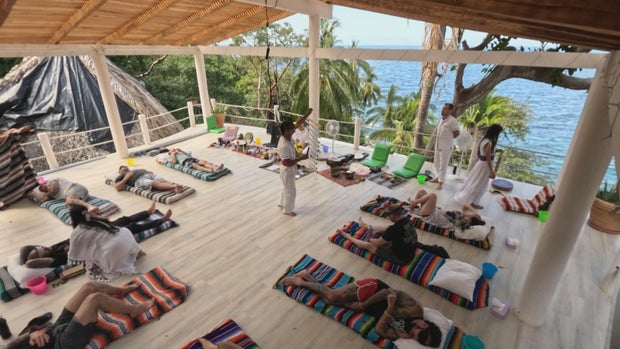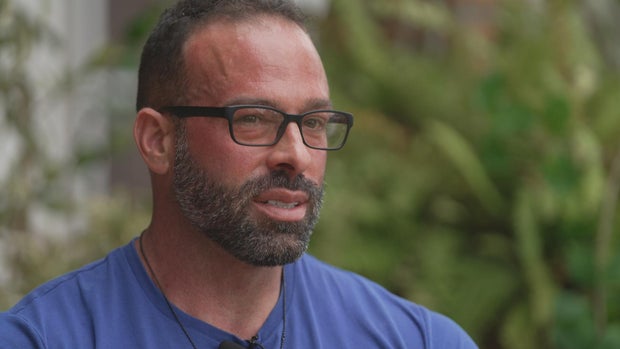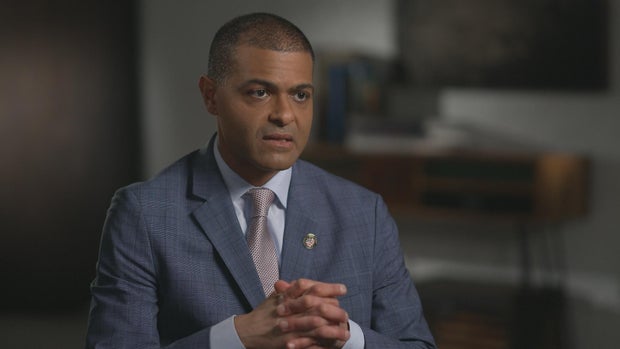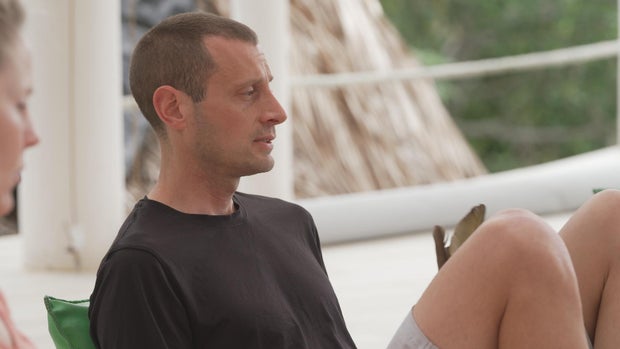Marine veteran and firefighter Ed Glover appeared caught between rapture and deep sorrow an hour after drinking a psilocybin tea during a retreat in Mexico.
He and other veterans, desperate for help, are attending psychedelic retreats in countries where the drugs are legal to use, mostly in indigenous ceremonies. Glover came home from Afghanistan angry, anxious, hyper-vigilant and struggling with suicidal ideations.
“I feel like one or two traumatic events you may be able to recover from, but kind of seeing it day in, day out really takes its toll,” Glover said.
Dealing with PTSD
The trip into the unknown was a risk worth taking for TJ Duff, a former Navy sailor. Duff was 18 when he joined the Navy. Months into his first deployment aboard the USS Cole, he says he narrowly escaped death when two suicide bombers attacked the ship in Yemen, killing 17 sailors.
“Being optimistic is hard for me,” he said. “Because I’ve been through a lot of therapy, a lot of different treatments. And not a lot of success.”
Randy Weaver, a police officer in New York and a former staff sergeant in the Army, was diagnosed with PTSD in 2007 after returning home from tours in Bosnia, Iraq and Afghanistan. He described his PTSD as “kind of a self-destructive form.” Weaver told 60 Minutes he constantly thinks about traumatic events from his service, ruminating on how they could’ve gone differently. These events were something he hoped to revisit while taking psilocybin.
60 Minutes
Weaver said he’s tried nearly every treatment for PTSD the VA offers, including talk therapy, exposure therapy, meditation and antidepressants.
“You get to a point where you’re so mentally exhausted and you’ve…created so much destruction that your demons tell yourself that these, your family would be better off without you, and when those demons tell you those things every day… it’s something hard to ignore,” he said.
Some of the veterans’ struggles began long before they joined the military. Navy vet Michael Giardina had an emotionally abusive father who killed himself 15 years ago. Giardina’s sister died by suicide five months before he came to Mexico.
Why psychedelics
Glover, Duff, Weaver and Giardina were among nine veterans who last March attended a psychedelic retreat organized by the Heroic Hearts Project. Jesse Gould, a former Army ranger, founded the Heroic Hearts Project in 2017 after he tried another psychedelic, ayahuasca, at a retreat in Peru. Gould says psychedelics can help vets revisit traumatic moments in ways they may be unable to with other therapies.
“The value of what we’re finding with psychedelics is it’s a very individualistic journey,” Gould said. “It comes at you. It brings up the emotions. It heightens your senses. And so you’re having to face it.”
60 Minutes
He views it as a flaw in the system that veterans in need are having to go to other countries for help.
Last year, the Department of Veterans Affairs announced it would begin funding its own clinical trials to treat post-traumatic stress disorder, depression and addiction, using two psychedelic drugs, psilocybin and MDMA. Even if these trials are successful, it would be years before the VA could prescribe either drug for its patients.
The trip to — and in — Mexico
This past March, 60 Minutes was invited to join nine veterans who traveled to the west coast of Mexico for a psychedelic journey they hoped would finally help ease their pain.
To qualify for the retreat, the veterans had to work with their own doctors to wean off any antidepressant or anxiety medication they might be taking because of how it could interact with the psychedelics. They also had to have a medical screening and no family history of psychosis or schizophrenia.
A local doctor was on site for the veterans during their journey, but no mental health professionals. The Heroic Hearts Project hired traditional healers to conduct three psychedelic ceremonies. The first two are with psilocybin, a psychoactive compound found in some mushrooms. It’s been used as a medicine by indigenous communities in Mexico, as well as elsewhere, for centuries.
Healers stirred the ground-up mushrooms into a tea. The veterans drank it, put on blindfolds to shut out distractions, and lay down.
60 Minutes
About an hour later, Michael Giardina raised his hand for help. His foot started to shake, followed by his whole body. By hour three, it was clear the drug had kicked in. However, Randy Weaver and TJ Duff barely seemed to move.
Five hours after they drank the tea, the psilocybin started to wear off.
The group gathered the next day to discuss what they’d gone through.
“It literally felt like an exorcism,” Giardina said. “My foot was going crazy, and I could kind of feel like my body was convulsing.”
Glover said he felt like he’d experienced the last breath of any victim, patient or friend he’d ever lost.
“So I really struggled to breathe yesterday,” Glover said.
Duff, however, found the experience unsettling and, at times, scary.
“I’ve heard a lot of you guys’ stories and I did not get as immersive as you guys did,” he said. “I’m kind of glad I didn’t, honestly, because I was kind of afraid of that.”
60 Minutes
That night, Duff took part in another psilocybin ceremony, but the next day, he left.
The last ceremony of the retreat was with 5-MeO-DMT, a powerful and fast-acting psychedelic secreted from a toad.
After the veterans returned home, they had several virtual meetings with a Heroic Hearts project counselor.
Department of Veterans Affairs studying psychedelics
The Department of Veterans Affairs warns against “self-medicating” with psychedelics or using them as “part of a self-treatment program.” While the VA’s former top doctor, Shereef Elnahal, is enthusiastic about the potential of psychedelics, he does have some concerns about the psychedelic retreats.
“They can concern me because there’s no way to monitor, certify, make sure that they’re actually safe environments,” Dr. Elnahal said.
In August, the Food and Drug Administration rejected a pharmaceutical company’s application to use the psychedelic MDMA in combination with therapy as a treatment for PTSD, after an FDA advisory panel said there wasn’t enough evidence it was safe or effective.
60 Minutes
The VA is now conducting nine clinical trials using MDMA and psilocybin to treat PTSD, depression and addiction. According to Dr. Elnahal, a small Phase 2 trial by the VA using MDMA and therapy to treat PTSD completed last year showed real promise.
“Forty-five percent have gone into complete remission, which is essentially a ‘normal emotional state.’ That is unheard-of with…prolonged exposure, cognitive processing, and certainly SSRIs, the current standard-of-care options,” he said.
The next step is larger Phase 3 clinical trials. Dr. Elnahal said he’s optimistic, but it could be another couple of years before veterans could go to the VA and get this therapy. Robert F. Kennedy Jr., who President Trump would like to lead the Department of Health and Human Services, has said he believes it’s a breakthrough therapy.
“The incoming administration is going to take, you know, a pretty bold stance on this,” Elnahal told 60 Minutes in December.
Checking back in with the veterans
Nearly a year after that retreat in Mexico, 60 Minutes checked in with the nine veterans who attended. Duff said the whole experience caused a dangerous decline in his mental health. He’s now back on antidepressant medication.
But the other eight veterans said their symptoms had improved. They called their experience with psychedelics “life-changing.”
Glover, who decided to retire from his job as a firefighter shortly after the retreat, feels a weight has been lifted off his shoulders. Before the retreat, Glover said he thought about suicide almost every day.
60 Minutes
“I had a very close call. You know, the note, the gun,” Glover said. “That is no longer the case.”
Weaver said his suicidal ideations have stopped as well.
“I don’t have any of those thoughts since going through this journey,” he said.
If you or someone you know is in emotional distress or suicidal crisis, call the National Suicide Prevention Hotline at 988 or 1-800-273-TALK (8255).
For more information about mental health care resources and support, The National Alliance on Mental Illness (NAMI) HelpLine can be reached Monday through Friday, 10 a.m.–6 p.m. ET, at 1-800-950-NAMI (6264) or email info@nami.org.



